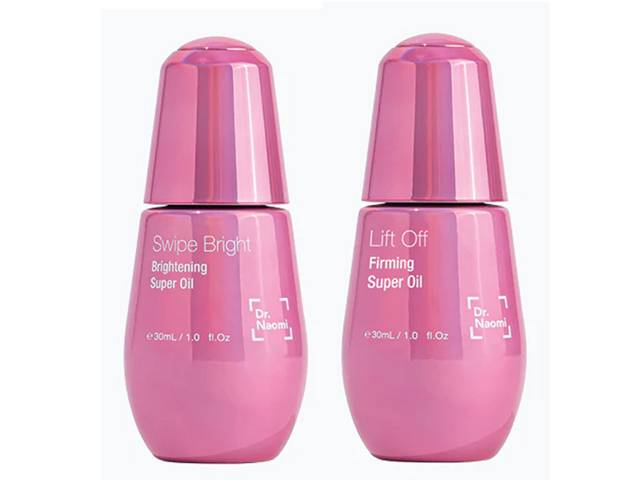Dr Naomi Swipe Bright & Lift Off

Face oils have had a renaissance, they're the skincare du jour and the slick elixir behind the 'glazed donut' look dubbed by Hailey Bieber. They're responsible for ultra-hydrated, plump and glossy, youthful skin but they've had a bad wrap, posing questions like: 'Will face oil make me breakout?', 'Does face oil make my oily skin oilier?', 'Will my face oil clog my pores?' School is in session and we're here to bust these myths and misconceptions.
Swipe Bright
Super Oil to brighten, even skin tone & balance skin.
$129.00
Lift Off
Super Oil to visibly firm, lift & deeply nourish.
$139.00
First, let'stalk formulation and chemistry. Skin is made up of both oil and water, so it's important your skincare routine is the same – these come in the form of occlusives and humectants. Occlusives are moisturising agents that seal and trap moisture in the skin like Cling Wrap, they form a protective layer over the surface to prevent moisture loss while hydrating cracked cells (think: heavy creams or rich oils). Humectants sit on top of the skin and draw moisture from the air or deeper in the epidermis and keep it from evaporating to prolong hydration (think: serums and hyaluronic acid).
Occlusives and humectants are a perfect pairing, working together to condition, hydrate and plump skin. Oils should be a staple in any skincare routine, these silky potions are rich in essential fatty acids, vitamins and antioxidants, they help to strengthen the lipid barrier, soothe skin and deeply nourish – which is important no matter what your skin concerns are.
Myth: Oils aren't anti-ageing
False. Oils are packed with antioxidants, slowing down the ageing process by defending the skin from free radical damage (the culprits behind collagen breakdown), helping to improve firmness and elasticity. Dr Naomi's very own Lift Off Super Oil is formulated with science-backed ingredients, promoting intense skin tightening, firming, and conditioning to help skin look more defined and supple. It even contains Bakuchiol – nature's alternative to retinol (AKA the hero youth-booster).
Misconception: Oils are only for Winter
Guess again, friend. Just like you swap your heavy, rich cream to a lightweight lotion in Summer, the same goes for oil. Swap your cream out for a lightweight oil. Advances in the way oil has been refined and formulated means they're lighter, more fluid and penetrate and absorb into skin, leaving no sticky residue behind.
*A note on molecular size: Lightweight formulations are thinner and have a smaller molecular size and better absorption capabilities, whereas heavier, thicker oils have a larger molecular size, working more on the surface of the skin and taking longer to soak in.
Misconception: Oils cause breakouts and clogged pores
OK! Naturally-derived oils such as rosehip, jojoba and macadamia aren't the cause of breakouts. Instead, it's comedogenic, pore-clogging oils like mineral and some synthetics that can lead to pimples – especially if you have acne-prone skin. If you're prone to pimples, look for anti-bacterial and anti-inflammatory ingredients like tea tree, rosehip, rosemary and jojoba.
Myth: Oil makes your skin more oily
*Wrong answer buzzer* Because your skin naturally produces oil, it's compatible with oily products. Sure, it seems counterintuitive to slather your skin in oil when it's already oily, but certain ingredients help regulate oil production.
Often, oily skin is oily because it's dehydrated and low in linoleic acid. When the skin is low in oil, it goes into overdrive producing more oil than needed. By including an oil high in linoleic acid like jojoba (the closest plant match to our skin's own sebum), you can rebalance the skin and regulate oil production. Shout out to Swipe Bright Super Oil, an illuminating elixir utilising jojoba oil supercharged with a synergistic blend of cutting-edge skin brighteners and lighteners working to even tone and deeply condition skin.
When it comes to application, there can be confusion. Follow the general rule of thinnest to thickest. If you're not sure, blending a few drops of oil into your moisturiser will do the trick.
MORE



